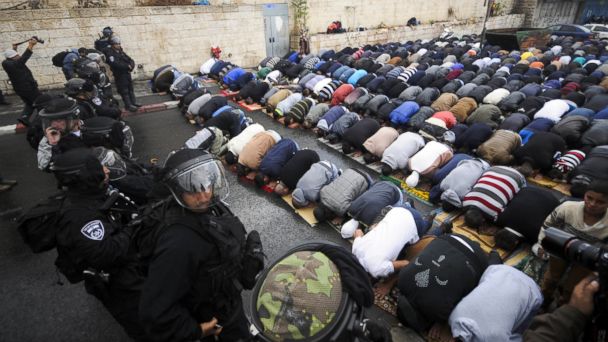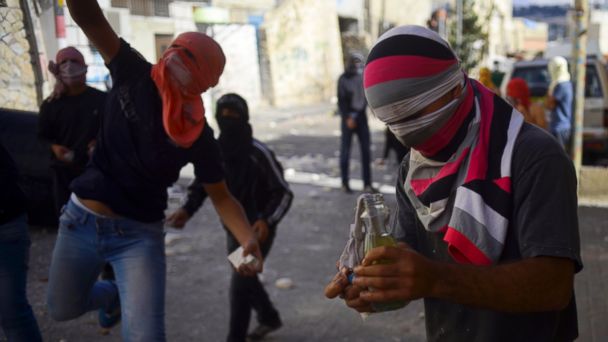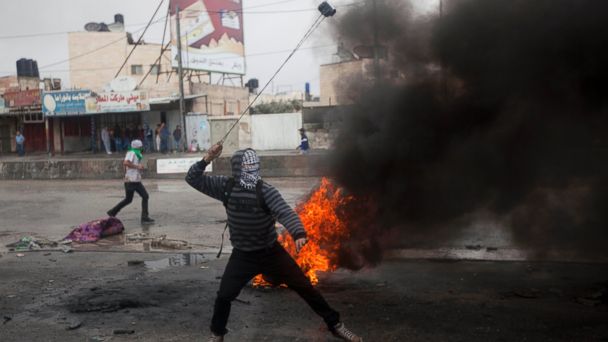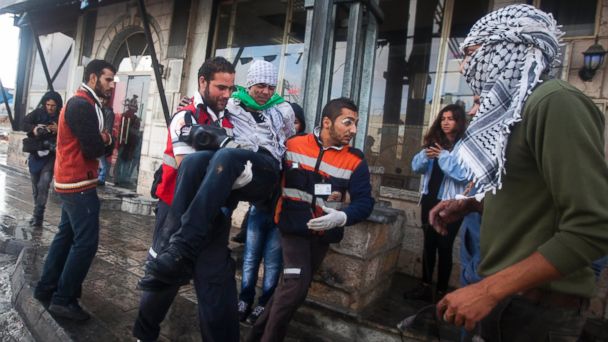Clashes in Jerusalem, West Bank Amid Rising Tension

Israeli border police block a road as Palestinians pray in Jerusalem, Oct. 31, 2014. Mahmoud Illean/AP Photo
JERUSALEM - Scattered clashes erupted around Jerusalem and the West Bank on following Friday's midday Muslim prayers as tension and violence grow with the shooting death by Israeli police of a Palestinian man and Thursday's closure of Jerusalem's al-Aqsa compound, the third holiest site in Islam.
At least eight Palestinians were reported wounded in clashes with Israeli forces today at the Qalandiya checkpoint between Jerusalem and the West Bank city of Ramallah. There had been calls by Palestinian leaders for a "Day of Rage" after Muataz Hijazi, 32, was gunned down Thursday morning by Israeli border police, suspected of trying to assassinate a prominent right-wing Israeli activist.
The Threat Posed by Al-Aqsa Mosque Closing in Jerusalem
The same day, Israeli authorities closed down the compound of the al-Aqsa Mosque and Dome of the Rock, known as the Noble Sanctuary to Muslims and the Temple Mount to Jews. It was the first time since 1967 that the compound in Jerusalem's Old City had been completely closed off.

Palestinian youths throw stones during clashes with Israeli border police after Moatez Higazi was shot in east Jerusalem, Oct. 30, 2014. Mahmoud Illean/AP Photo
With Palestinian anger on the rise, it was announced that the compound would be re-opened today, but for only for male Muslim worshippers over the age of 50 , as well as women of any age. This morning, Israeli police in riot gear encircled the Old City and lined its alleyways before the prayers, as people filed through barricades toward the mosque.
But as the prayers ended, the skies opened up, dampening the violence the city had been bracing for. Many of the police reinforcements that had been called in were seen leaving as the rains got heavier and it became clear there wouldn't be confrontations there.
As the drizzle continued, police and protesters clashed elsewhere, including the West Bank cities of Bethlehem and Hebron, as well as Jerusalem's Wadi Joz and Abo Tur neighborhoods, near the home of Muataz Hijazi.

A Palestinian uses a sling shot during clashes with Israeli troops at Qalandia checkpoint near the West Bank city of Ramallah, Oct. 31, 2014. Majdi Mohammed/AP Photo
Hijazi is suspected by Israeli police of shooting four bullets into the torso of American-born Rabbi Yehuda Glick, a well-known activist who advocated the building of what's known as the Third Temple on the site of the al-Aqsa mosque, as well as campaigning for the rights of Jews to pray in the compound, which is forbidden.
Glick was coming out of a conference called "Israel Returns to the Temple Mount" at Jerusalem's Begin Center when a man on a motorcycle shot him. Hijazi's cousin told the BBC that he was executed by police on the roof of his home.
All this comes after months of almost daily clashes between Palestinians and Israeli police in Jerusalem, sparked in July after a Palestinian teen was burned to death by Jewish extremists, believed to have been motivated by the killing of three Israeli teens by Palestinians from Hebron. The growing violence has raised fears of a third Palestinian intifada, or uprising. After the closure of the al-Aqsa compound, Palestinian President Mahmoud Abbas said it was tantamount to "a declaration of war."

Palestinian medics carry a man injured in clashes with Israeli troops at Qalandia checkpoint near the West Bank city of Ramallah, Oct. 31, 2014. Majdi Mohammed/AP Photo